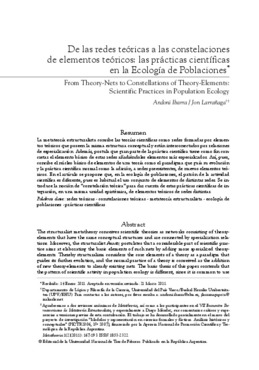De las redes teóricas a las constelaciones de elementos teóricos : las prácticas científicas en la Ecología de Poblaciones
Abstract
La metateoría estructuralista concibe las teorías científicas como redes formadas por elementos teóricos que poseen la misma estructura conceptual y están interconectados por relaciones de especialización. Además, postula que gran parte de la práctica científica tiene como fin concretar el elemento básico de estas redes añadiéndoles elementos más especializados. Así, pues, concibe el núcleo básico de elementos de una teoría como el paradigma que guía su evolución y la práctica científica normal como la adición, a redes preexistentes, de nuevos elementos teóricos. En el artículo se propone que, en la ecología de poblaciones, el patrón de la actividad científica es diferente, pues es habitual el uso conjunto de elementos de distintas redes. Se introduce la noción de "constelación teórica" para dar cuenta de estas prácticas científicas de integración, en una misma unidad epistémica, de elementos teóricos de redes distintas. The structuralist metatheory conceives scientific theories as networks consisting of theory-elements that have the same conceptual structures and are connected by specialization relations. Moreover, the structuralist Ansatz postulates that a considerable part ofscientific practice aims at elaborating the basic elements of such nets by adding morespecialized theory-elements. Thereby structuralism considers the core elements of a theory as a paradigm that guides its further evolution, and the normal practice of a theory is conceived as the addition of new theory-elements to already existing nets. The basic thesis of this paper contends that the pattern of scientific activity in population ecology is different, since it is common to use theory-elements from distinct nets. In order to take into account these practices the concept of "theoretical constellation" is introduced intending to capture the idea of an epistemic unification of theory-elements that come from different nets.

